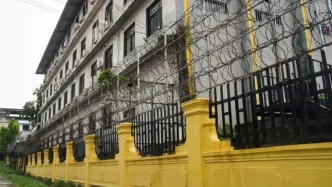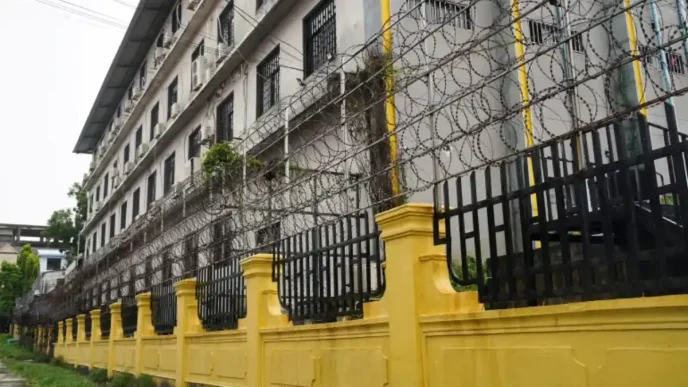In a development that has heightened geopolitical tensions in the West Philippine Sea, Philippine authorities have arrested seven individuals—six foreign nationals and one Filipino—on suspicion of espionage. The suspects, apprehended on Grande Island in Subic Bay, are accused of posing as recreational fishermen while using high-tech drones to monitor naval movements, including those of allied forces, in this strategically critical region.
A Covert Operation Uncovered
On March 19, 2025, the National Bureau of Investigation (NBI) detained five Chinese nationals, one Cambodian, and a Filipino bodyguard following a surveillance operation on Grande Island, a small but tactically significant landmass in Subic Bay. The NBI revealed that the group had been under observation since last year due to the island’s potential as a vantage point for covert activities. Located near key maritime routes, Grande Island offers a clear view of naval assets entering and exiting Subic Bay, a hub for joint military exercises and patrols in the disputed West Philippine Sea.
Van Homer Angluben, executive officer of the NBI’s Cybercrime Division, told reporters that the suspects were observed flying drones at specific times when ships passed by. “In our surveillance, we noticed these personalities were there on the island in the guise of recreational fishers … We also noticed that they were flying drones at times when boats were passing by” he said. Authorities recovered photographic and video evidence, including images of a US naval vessel and a naval operating base, as well as cargo ships transiting the area.
Among the more concerning discoveries was a piece of paper written in Chinese, which, when translated, detailed the dates, times, and identities of boats entering and leaving Subic Bay port. Additionally, fake Bureau of Internal Revenue documents and identification cards were seized, raising questions about the extent of the group’s deception and possible broader networks of support.
Identities and Legal Complications
The five Chinese suspects were named as He Peng (also known as Nan Ke), Xu Xuning, Ye Tianwu (also known as Qui Feng or Quing Feng), Ye Xiaocan, and Su Anlong. The Cambodian national was identified as Dick Ang, and the Filipino as Melvin Aguillon. Notably, Ye Tianwu has an outstanding arrest warrant issued by a Tarlac City court for violations of the Securities Regulation Code, adding a layer of complexity to the case. While the NBI has not disclosed whether this prior legal issue is connected to the espionage allegations, it underscores potential vulnerabilities in tracking foreign nationals with criminal records operating within Philippine territory.
The arrests followed an intelligence tip from the Armed Forces of the Philippines on March 17, which indicated that a group of foreign nationals was conducting suspicious activities on an island in Subic Bay. Eyewitness accounts further corroborated the NBI’s findings, with reports of the suspects lingering at wharves until late hours, seemingly monitoring naval movements. “Due to its contiguity and strategic location, the island allows the group to monitor naval assets entering and exiting Subic Bay during maritime patrols or joint naval exercises in the West Philippine Sea” the NBI stated in a press release.
Geopolitical Implications
The West Philippine Sea, part of the broader South China Sea, remains a flashpoint for territorial disputes involving China, the Philippines, and several other Southeast Asian nations. China claims nearly all of the resource-rich waterway under its controversial “nine-dash line,” a stance rejected by an international tribunal in 2016. The Philippines, backed by allies such as the United States, has sought to assert its sovereign rights over its exclusive economic zone, leading to frequent confrontations with Chinese vessels, including fishing boats and coast guard ships.
Subic Bay, once a major US naval base and now a commercial and strategic hub, plays a pivotal role in regional security. The area hosts joint military exercises under agreements like the Enhanced Defense Cooperation Agreement (EDCA) between the Philippines and the United States. The presence of foreign nationals allegedly monitoring such activities raises serious concerns about the vulnerability of sensitive military operations to espionage. If confirmed, these actions could represent a direct challenge to Philippine sovereignty and the security of its international partnerships.
Analysts suggest that the use of drones and other surveillance equipment points to a sophisticated operation, potentially backed by state or organized actors. However, no concrete evidence has yet been presented to link the suspects to any specific government or entity. The Philippine government has so far refrained from making direct accusations against China, though the nationality of most suspects has fueled speculation among observers. “At this stage, we must avoid jumping to conclusions about state involvement until further investigations are complete” cautioned a senior official from the Department of Foreign Affairs, speaking on condition of anonymity.
Domestic and International Reactions
Within the Philippines, the arrests have sparked a mix of alarm and calls for stronger border and maritime security. Lawmakers in Manila have urged the government to tighten regulations on foreign nationals operating in sensitive areas, particularly near military installations. Public sentiment, as reflected in social media posts on platforms like X, shows growing frustration over perceived foreign interference in Philippine waters. Many users have linked the incident to broader anxieties about China’s assertiveness in the West Philippine Sea, though others caution against inflaming tensions without definitive proof.
Internationally, the incident has drawn attention amid ongoing US efforts to “reestablish deterrence” against Chinese aggression in the region, as reported by local media. The United States, which maintains a strong military presence in the Indo-Pacific, has not yet issued an official statement on the arrests. However, the recovery of images of US naval vessels among the suspects’ possessions is likely to intensify scrutiny of security protocols during joint exercises. Other allies, including Australia and Japan, who also participate in regional naval drills, may similarly reevaluate their operational safeguards in light of this breach.
Legal and Investigative Challenges
The NBI faces significant hurdles in building a watertight case against the suspects. Espionage charges require clear evidence of intent to harm national security or transmit sensitive information to a foreign power. While the recovered materials—drones, photographs, and handwritten notes—suggest covert surveillance, prosecutors must establish a direct link between these activities and a broader threat. Legal experts note that the use of fake identification documents could complicate matters further, potentially indicating a wider network of illicit operations that extends beyond espionage.
Additionally, the involvement of foreign nationals raises diplomatic considerations. Deportation, prosecution, or extradition processes could strain Manila’s already delicate relations with Beijing, particularly if the Chinese government intervenes on behalf of its citizens. The Philippine government will need to balance its commitment to national security with the risk of escalating tensions in an already volatile region. For now, the suspects remain in custody as investigations continue, with the NBI promising to release further updates as evidence is processed.
Broader Security Concerns
The Grande Island incident is not an isolated event but part of a pattern of growing concerns about espionage and covert activities in Southeast Asia. In recent years, reports of unauthorized drone sightings near military installations have increased across the region, from Thailand’s southern borders to Indonesia’s remote islands. The accessibility of advanced surveillance technology, coupled with the strategic importance of maritime chokepoints like Subic Bay, has made such locations prime targets for intelligence-gathering operations.
For the Philippines, the challenge lies in enhancing its capacity to detect and deter such activities without compromising its openness to tourism and foreign investment. Grande Island, for instance, is a popular destination for recreational activities, making it difficult to distinguish between legitimate visitors and those with ulterior motives. Proposals for increased patrols, stricter access controls, and advanced monitoring systems are under discussion, though funding and implementation remain significant obstacles for a country with limited resources compared to its larger neighbors.
Looking Ahead
As the investigation into the Grande Island arrests unfolds, the incident serves as a stark reminder of the fragile balance of power in the West Philippine Sea. With naval exercises, territorial disputes, and geopolitical rivalries converging in this contested waterway, even small breaches of security can have outsized consequences. For now, questions linger over the true intentions of the suspects and the potential ramifications for Philippine sovereignty and regional stability. Whether this case marks a turning point in Manila’s approach to maritime security or merely another chapter in an ongoing struggle remains to be seen.














